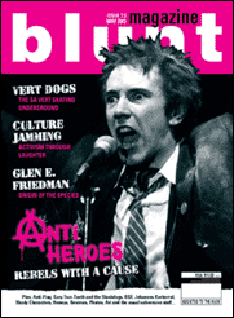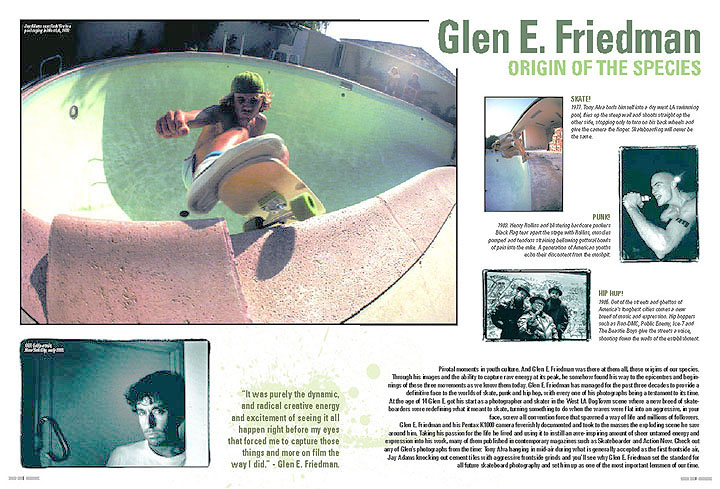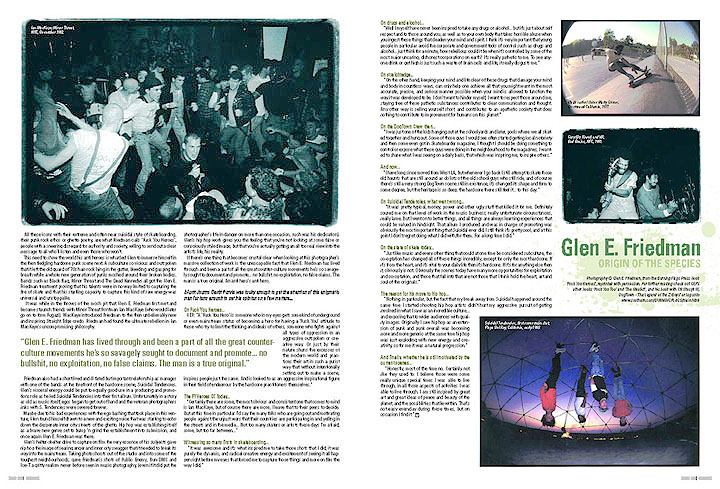blunt
magazine
(from South Africa)
ISSUE 7.3 - MAY 2003

Glen E. Friedman
ORIGIN OF THE SPECIES
SKATE!
1977. Tony Alva hurls himself into a dry west LA swimming pool, flies up the steep wall and shoots straight up the other side, stopping only to turn
on his back wheels and give the camera the finger. Skateboarding will never be the same.
PUNK!
1983. Henry Rollins and blistering hardcore punkers Black Flag tear
apart the stage with Rollins, muscles pumped and tendons straining bellowing
gutteral howls of pain into the mike. A generation of American youths echo
their discontent from the moshpit.
HIP HOP!
1985. Out of the streets and ghettos of America's toughest cities comes a new breed of music and expression. Hip hoppers such as Public Enemy, Ice-T and The Beastie Boys are give the streets a voice, shouting down the walls of the establishment.

Pivotal moments in youth culture. And Glen E. Friedman was there at them
all, these origins of our species.
Through his images and the abilty to capture raw energy at its peak,
so somehow find his way to the epicentres and beginnings of these three
movements as we know them today. Glen E. Friedman has managed for the
past three decades to provide a definitive face to the worlds of skate, punk
and hiphop, with every one of his photographs being a testament to its time.
At the age of 14 Glen E. got his start as a photographer and skater
in the West LA Dogtown scene where a new breed of skateboarders were
redefining what it meant to skate, turning something to do when the waves were flat into an aggressive, in your face, screw all convention force that spawned a
way of life and millions of followers.
Glen E. Friedman and his Pentax K1000 camera feverishly documented
and took to the masses the exploding scene he saw around him. Taking his
passion for the life he lived and using it to instill an awe-inspiring amount of
sheer untamed energy and expression into his work, many of them
published in contemporary magazines such as Skateboarder and Action Now. Check out any of Glen's photographs from the time: Tony Alva hanging in mid-air during what is generally accepted as the first frontside air, Jay Adams knocking out cement tiles with aggressive frontside grinds and you'll see why Glen E.
Friedman set the standard for all future skateboard photography
and set him up as one of the most important lensmen of our time.
All these icons with their extreme and often near suicidal
style of skateboarding, their punk rock ethos or ghetto poetry, are what
Friedman calls 'Fuck You Heroes., people with a sneering disregard for
authority and society, willing to send out a clear message to all who'll
listen and even those who won't.
This need to show the world his anti heroes is what led Glen to
immerse himself in the then fledgeling hardcore punk scene next.
A subculture so vicious and outspoken that it left the old guard of '70s hair-rock lying in the gutter, bleeding and gasping for breath while a whole new generation of punks moshed around their broken bodies. Bands such as Black Flag, Minor Threat and The Dead Kennedys all got the Glen E. Friedman treatment proving that his talents were in no way limited to capturing the fire of skate and
that his startling capacity to capture this kind of raw energy was universal
and unstoppable.
It was while in the throws of the mosh pit that Glen E. Friedman first
met and became staunch friends with Minor Threat frontman Ian MacKaye (who
would later go on to form Fugazi). MacKaye introduced Friedman to the then
unbelievably new and inspiring Straight Edge credo. Friedman had found the
ultimate rebellion in Ian MacKaye's uncompromising philosophy.
Friedman also had a short lived and ill fated but important
relationship as manager with one of the bands at the forefront of the hard core
scene, Suicidal Tendancies. Glen's explosive visceral energy could be put to
equally good use in a producing and promotions role as he lead Suicidal
Tendancies to create some of their most important work to date.
Unfortunately in a story as old as music itself, egos began to get out of
hand and the veteran photographers links with S. Tendancies were severed
forever.
Maybe due to his bad experiences with the ego bashing that took place in
this venture, Glen found himself drawn to a new and exciting voice that was
starting to echo down the desperate inner city streets of the ghetto. Hip
hop was establishing itself as a brave new genre set to bump 'n grind
the establishment into submission, and once again Glen E. Friedman was
there.
Glen's helter-skelter drive to capture on film the very essence of his
subjects gave hip hop the image of searing anger and inner city swagger that
it needed to break its way into the mainstream. Taking photo shoots out of
the studio and into some of the toughest neighbourhoods, gave Friedman's
album cover shots for Public Enemy, Run DMC and Ice-T a gritty realism never
before seen in music photography, (even if it did put the photographers life
in danger on more than one occasion, such was his dedication). Glen's hip
hop work gives you the feeling that you're not looking at some false or
conciously styled image, but that you're actually getting an all too real
view into the artist1s life, his reality.
If there's one thing that becomes crystal clear when looking at this
photographer's massive collection of work is the unescapeable fact that Glen
E. Friedman has lived through and been a part of all the great
counter-culture movements he's so savagely sought to document and
promote... no bullshit, no exploitation, no false claims. The man is a true original.
An anti hero's anti hero.

blunt Journo Devin Purvis was lucky enough to get the attention of this
enigmatic man for long enough to get his opinion on a few matters...
On Fuck You Heroes...
GEF: "A 'Fuck You Hero' is someone who in my eyes gets some kind of
underground or even mainstream status of becoming a hero for having a
'Fuck You' attitude to those who try to limit the thinking and ideals of
others, someone who fights against all types of oppression in an aggressive
outspoken or creative way. Or just by their nature shuns the excesses of
the modern world and practices their art in such a purist way that without
intentionally setting out to make a scene, inspires people just the same.
And is looked to as an aggressive inspirational figure in their field of
endeavour by the hardcore practioners themselves."
The FYHeroes Of Today...
"Certainly there are some, the most obvious and consistent one that comes to mind is Ian MacKaye, but of course there are more, I leave that to their peers to decide. But at this time in particular I1d say the many folks who are going out and motivating people against the unjust wars that their countries are participating in and yelling in the streets in the media... Not too many skaters or artists these days I'm afraid; some, but too far between..."
Witnessing so many firsts in skateboarding...
"It was awesome and it1s what inspired me to take those shots that I
did, it
was purely the dynamic, and radical creative energy and excitement of
seeing
it all happen right before my eyes that forced me to capture those
things
and more on film the way I did."
On drugs and alcohol...
"Well I myself have never been inspired to take any drugs or alcohol...
but
It's just about self respect and to those around you, as well as to your
own
body that takes horrible abuse when you ingest these things that deaden
your
mind and spirit. I think it's very important that young people in
particular
avoid the corporate and government tools of control such as drugs and
alcohol... just think for a minute, how
rebellious could it be when it1s controlled by some of the most major
uncaring, dishonest corporations on earth. It1s really pathetic to me.
To
see anyone drink or get high is just such a waste of brain cells and
life,
it really disgusts me."
On straightedge...
"On the other hand, keeping your mind and life clear of these drugs that
damage
your mind and body in countless ways, can only help one achieve all that
you
might want in the most accurate, precise, and serious manner possible
when
your mind is allowed to function the way it was developed to be. I don1t
want to hinder myself, I want to respect those around me, staying free
of
these pathetic substances contributes to clear communication and
thought.
Any other way is selling yourself short, and contributes to an apathetic
society that does nothing to contribute to improvement for humans on
this
planet."
On the DogTown Crew then...
"I was just one of the kids hanging out at the schoolyards and later,
pools
where we all skated together and hung out. Some of those guys I would
see
often started getting local notoriety and then some even got in
Skateboarder
magazine, I thought I should be doing something to control or expose
what
these guys were doing in the neighourhood to the magazines, I wanted to
share what I was seeing on a daily basis, that which was inspiring me,
to
inspire others."
And now...
"I have long since moved from West LA, but whenever I go back I still
attempt to skate those old haunts that are still around as do lots of
the
old school guys who still ride, and of course there's still a very
strong
DogTown scene still in existence, it1s changed its shape and form to
some
degree, but the heritage is so deep; the hardcore there still feel it...
to
this day."
On Suicidal Tendancies, what went wrong...
"It was pretty typical, money, power and other ugly stuff that killed it
for
me. Definitly soured me on that level of work in the music �business1;
really unfortunate circumstances, really lame. But I went on to better
things, and all things are always learning experiences that could be
valued
in hindsight. That album I produced and was in charge of promoting was
obviously the most important thing that Suicidal ever did. I still think
it1s pretty cool, and at this point I don't regret doing what I did
with/for
them. For a long time I did."
On the state of skate today...
"Just like music and every other thing that could at one time be
considered
subculture, the co-optation has changed all of these things incredibly,
except for only the most hardcore. If it's from the heart, and it1s
vital to
your daily life then it1s hard core. If it1s for anything else then it,
obviously is not. Obviously the scenes today have many more
opportunities
for exploitation and co-optation, and those that fall into that are not
those that I think hold the heart, art and soul of the originals."
The reason for his move to hip hop...
"Nothing in particular, but the fact that my break away from Suicidal
happened
around the same time I started shooting hip hop artists didn't hurt my
aggressive pursuit of getting involved in what I saw as an incredible
culture... and exposing that to wider audiences with quality images.
Orignally I saw hip hop as an extention of punk and punk overall was
becoming more and more generic at the same time hip hop was just
exploding
with new energy and creativity, so for me it was a natural progression."
And finally, whether he is still motivated by the current scenes...
"Honestly, most of the time no. Certainly not like they used to. I
believe
those were some really unique special times I was able to live through,
in
all those aspects of activities I was able to live through. I am still
inspired by great art and great ideas of peace and beauty of the planet,
and
the possibilities that lie within. That's not easy everyday during these
times, but on occasion I find it."
+++++++++++++++++++++++++++
Photography � Glen E. Friedman, from the Burning Flags Press book "Fuck You Heroes", reprinted with permission.
Further Reading: Check out GEF's books "Fuck You Heroes", "Fuck You Too" and
"The Idealist",
and his book with CR Stecyk III, "DogTown - The Legend of the Z-Boys"
or log onto www.southern.com/BURNINGFLAGS/main.php for more of the same.
BACK to OLD PRESS ARCHIVE index



